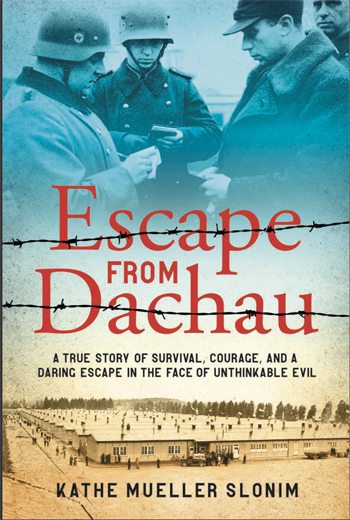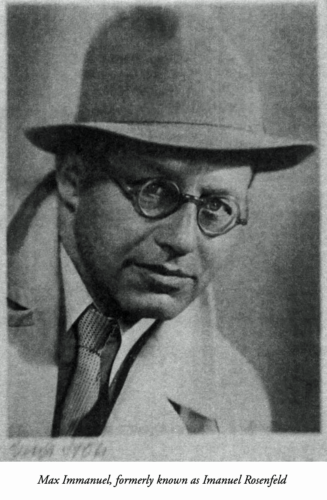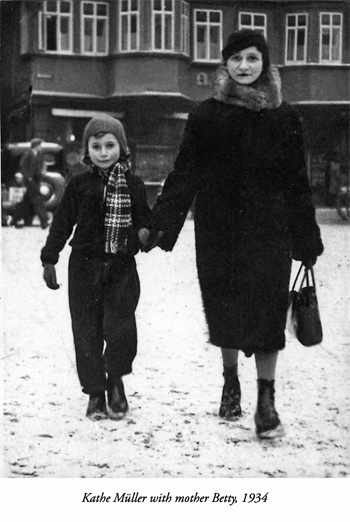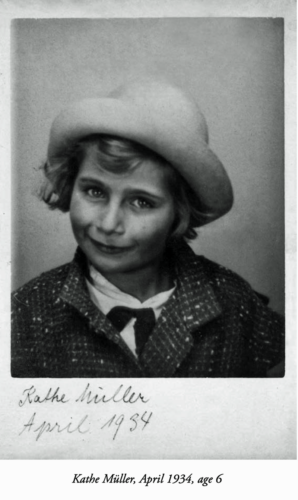By Mark Ellis —
The day after Kristallnacht, her Jewish grandfather was arrested and taken by the Nazis to Dachau, Germany’s first concentration camp. Her mother was hidden in a convent during that awful period in Germany’s history, when an anti-Semitic spirit captured the hearts of Adolf Hitler and his henchmen, who attempted to exterminate European Jews.
“These are real true events that need to be passed along,” Susan Servais told God Reports. Servais recently helped publish her mother’s memoirs, Escape from Dachau, the remarkable story of the daring rescue mission to help her grandfather escape from the abominable concentration camp.
For many years, Servais never heard a word about this dark period in her family history. Then her mother, Kathe Mueller Slonim, received an invitation from the mayor of Stuttgart to return to Germany. Following that family trip in 2000 Slonim began writing her memoirs, telling her children she did not want the book released until after her death.
“In 2021, at 94 years old, my mom passed, and that’s when we started on the path to having her story published,” Servais said.
 The book chronicles the harrowing mission undertaken by former First Reich official Max Immanuel, who climbed into his car in Berlin on a rainy night in December 1938 with one objective in mind: to rescue his cousin (Servais’ grandfather) from Dachau.
The book chronicles the harrowing mission undertaken by former First Reich official Max Immanuel, who climbed into his car in Berlin on a rainy night in December 1938 with one objective in mind: to rescue his cousin (Servais’ grandfather) from Dachau.
Max’s mission was particularly risky and unusual because this former German government official was a Jew himself. Born Imanuel Rosenfeld, Max had changed his name and religion, living in fear that his truth would be discovered.
“Imanuel Rosenfeld was a brilliant mathematician. He was a numbers guy; he worked at the Reich’s Bank in Berlin, which was the largest bank in Germany, under the president of the bank Hjalmar Schacht. Schacht was actually tried at the Nuremberg trials.”
“My grandfather, Adolf Mueller, fought for Germany in World War One, and so did my grandmother’s brothers. He couldn’t believe that loyal Germans that had served for Germany would actually be exterminated.”
By the time he awakened to the danger, it was too late. “He could no longer get out of Germany and there was nowhere to go. America, in early 1938 closed its doors to more immigrants. So, Jews were desperately trying to go to other countries.”
Then came Kristallnacht, also known as the “Night of Broken Glass,” November 9-10, 1938. It was a pogrom carried out by the Nazi regime during which Jewish businesses, synagogues, and homes were attacked, vandalized, and set on fire. Many Jews were arrested, and violence against them escalated, marking a significant turning point in the persecution of Jews in Nazi Germany and a prelude to the horrors of the Holocaust.
Max’s rescue mission to save his cousin required him to risk his life as he passed through one Nazi checkpoint after another, wielding expired Third Reich papers, claiming that he was a loyal member of the Nazi Party on official business.
The day after her grandfather’s arrest, her grandmother made a difficult decision. “My grandmother took my mom to the Catholic Church, the Sisters of St. Joseph, and asked them if they could take her and hide her and keep her safe.”
grandmother took my mom to the Catholic Church, the Sisters of St. Joseph, and asked them if they could take her and hide her and keep her safe.”
A few years later the sheltering plan was apparently discovered. “The friar of the Sisters of St. Joseph was murdered by the Nazis. No reason was ever given. But we can pretty much be sure that they found out they were hiding Jewish children.”
“The book really pays tribute to bravery, sacrifice, and the resilience of those who sought to flee the horrors of Nazi Germany.”
Some may not realize that Dachau was a work camp before it became part of Hitler’s “Final Solution” to exterminate the Jewish people. “They were building up their war machine, making airplanes and tanks — and parts for the gas chambers.”
 “My grandfather’s stories are so horrific. Many prisoners died at Dachau because of the way they were treated. They made them go out in the snow naked, hosed them down, and that was their showers. People froze to death and died because of their treatment. My grandfather’s sister, and her husband and their children were sent to Auschwitz, and they perished.”
“My grandfather’s stories are so horrific. Many prisoners died at Dachau because of the way they were treated. They made them go out in the snow naked, hosed them down, and that was their showers. People froze to death and died because of their treatment. My grandfather’s sister, and her husband and their children were sent to Auschwitz, and they perished.”
The issue that has burdened Servais the most involves the collaborators who helped the Nazis. “How is it that their friends and neighbors were turning in their Jewish friends and neighbors? How could that be? What happened to humanity during that period? I don’t know.”
“Why isn’t there intervention by God when bad things happen? I don’t know the answer. I’ve raised my children Jewish and we are a family of faith, and we believe a higher power takes care of us one way or another,” she explained.
“My mom never blamed anyone. She was a beautiful person. She worked in an elementary school that was in a very bad neighborhood. Many of those kids adopted my mom as their mom and loved her.
The current rise in anti-Semitic behavior troubles Servais. “There are events happening around the world that are really bad. And we just have to hope that those good people are out there and not being apathetic and not sitting back and watching, but taking action.
“I think it can happen again to the Jewish people. I think it can happen to others. We always say ‘never again.’ But when there are these crazy groups that are marching through streets with Nazi flags and signs, “kill Jews,” and they are not rejected by the public.
“Well, I think that our call for justice comes to play here and we ask the good people to stand up and not be apathetic, because I do believe that those people are the vocal minority. And we need to wake up the vocal majority and make sure that bad things don’t happen again.”



